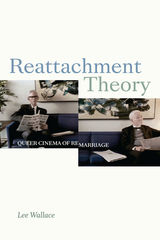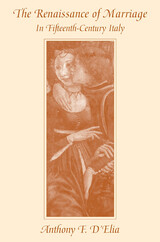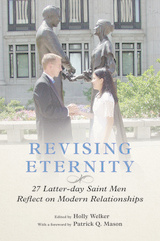6 start with R start with R

When Phyllis Barber’s thirty-three-year marriage ended, she had to redefine herself as a woman, a mother, and an artist. Raw Edges is her moving account of the “lean years” that followed her divorce. It is interwoven with a narrative of the marriage of two gifted people that begins with “sealing” in a Mormon temple, endures through the birth of four sons and the development of two careers, and founders when the couple’s personal needs no longer match their aspirations or the rigid strictures of Mormon life. Raw Edges reflects the predicament that many women experience as their marriages disintegrate and they fail to achieve their own expectations as well as those set by their society and their faith. It is also a story of hope, of how a woman overcome by grief and confusion eventually finds a new approach to life.


Weddings in fifteenth-century Italian courts were grand, sumptuous affairs that often required guests to listen attentively to lengthy orations given in Latin. In this book, Anthony D'Elia shows how Italian humanists used these orations to support claims of legitimacy and assertions of superiority among families jockeying for power, as well as to advocate for marriage and sexual pleasure.
Humanists stressed the value of marriage in practical terms as a means for consolidating wealth, forming political alliances, and maintaining power by providing heirs. They also presented women in a positive light, as helpmates and even examples of wisdom and learning. While D'Elia focuses on Italian courts, he also examines ideas about marriage and celibacy from Antiquity to Republican Florence and Reformation Germany, revealing the continuities and distinctions between Italian humanist and Protestant thought on marriage.
In bringing to life this fascinating elite culture, D'Elia makes a valuable contribution to the history of the Renaissance, women, and the family, and to studies of rhetoric and the classical tradition.

An insightful exploration of the gap between human realities and engrained ideals, Revising Eternity sheds light on how Latter-day Saint men view and experience marriage today.

Winner of the Agha Shahid Ali Poetry Prize
In The Rival, Sara Wallace takes her readers on an intimate journey through a woman’s solitary, surreal rural childhood and her brutal, sexually fraught first marriage to the conflicted redemption she finds in motherhood and a second chance at love. In this debut poetry collection, Wallace reveals how closely emotional devastation and transcendence can coexist. The Rival is sensuous, darkly humorous, and frequently luminous in its unflinching exploration of the inner life.

READERS
Browse our collection.
PUBLISHERS
See BiblioVault's publisher services.
STUDENT SERVICES
Files for college accessibility offices.
UChicago Accessibility Resources
home | accessibility | search | about | contact us
BiblioVault ® 2001 - 2024
The University of Chicago Press









